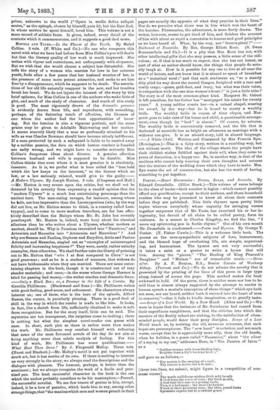pages are exactly the opposite of what they practise in
their lives." Nor do we perceive what there was in him which won the heart of the heroine. Fitzmanrice, the adventurer, is more finely drawn. The writer, however, seems to get tired of him, and finishes the account of him with about as rapid a conversion to honour and good principles as we have heard of. What, by the way, are" fratres pirati F"— Darkened at Noontide. By Mrs. George Elliott Kent. (S. Swan Sonnenschein and Co.)—It is a pity that Mrs. Kent has not, with other intellectual gifts that she may possess, a little sense of the ridi- culous; or, if that is too much to expect, that she has not learnt, as part of what an author should know, the things that people do actu- ally laugh at. How is it possible for any one to live at all near the world of letters, and not know that it is absurd to speak of breakfast as a " matutinal meal ;" and that such sentiment as, "so a stately ship plied its way down the sacred Ganges, freighted with a rare and costly cargo,—gems, gold-dust, and ivory, but what was their value, in comparison with the one true woman's heart ?" is just a little trite ? The story is of the most common-place kind. Margaret St. Osbert is left penniless, for her father has "mortgaged his estate for twenty years." A young soldier courts her—in a ruined chapel, wearing his sword, by the way—but he is bound to marry a wealthy bride. The wealthy bride in course of time elopes, and Mar- garet goes to take care of his house and child, a questionable arrange- ment, even though its " lord " is absent." Of course, he returns. The wealthy bride is conveniently removed, and the life that is darkened at noontide has as bright an afternoon as marriage with a widower can give. It is an absurd story, told in absurd language.
White Child. Written and illustrated by Mrs. Francis Rye. (Remington.)—This is a fairy-story, written in a rambling way, but not without merit. The idea of the village where the people have their childish wishes fulfilled against their will, when they come to years of discretion, is a happy one. So, in another way, is that of the maidens who cannot help weaving their own thoughts and natures into the texture of the wedding dress which they have to make. Mrs. Rye wants the art of construction, but she has the merit of having something to put together.


































 Previous page
Previous page